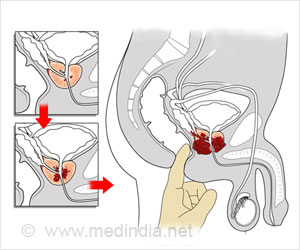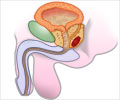Highlights
- Some prostate cancers are aggressive while others are non-threatening and previously there were no established methods to clinically distinguish the two.
- New clinical markers are required to predict the cancer behavior, so that men with milder types are spared from side-effects of surgery or radiotherapy.
- Using the Latent Process Decomposition (LPD) method, the study team identified a group cancers which shared common traits and designated them DESNT cancers, which had poor prognosis.
Prof Colin Cooper, professor of cancer genetics at UEA's Norwich Medical School, said "Previously, distinguishing the dangerous 'tigers' from the less threatening 'pussycats' has not been possible for many men."
"Curative treatment of early prostate cancer by surgery or radiotherapy needs to ideally be targeted to the minority of men with significant cancers, so that the remainder are spared the side-effects of treatment, which frequently includes impotence. Improved clinical markers are therefore required to predict behavior allowing radical therapies to be targeted to men with significant cancers, so that the remainder, with biologically unimportant disease, are spared the side-effects of treatment." Cooper added.
Latent Process Decomposition
Researchers have devised new method for classifying human prostate cancer using a mathematical approach.
By applying a new mathematical approach, researchers identified a novel 'poor prognosis' category of human prostate cancer called DESNT.
Opinions
Prof Vincent Moulton from UEA's School of Computing Sciences said "So far, mathematical approaches to categorising prostate cancers hasn't worked because of the diverse make-up of the samples, but by applying the LPD process, we revealed could group cancers which shared common traits, and designated them DESNT cancers."
"These were categorized by low expression of a core set of 45 genes, many encoding proteins involved in the structure of cells, transport of ions and cell adhesion. This was common across the samples of cancers known to have a poor patient prognosis." Multon added.
Bob Champion MBE said "We are extremely excited about the success of this test and very grateful to Professor Cooper and his team. Distinguishing the 'tigers' from the 'pussycats' will help the quality of life for so many men in the future'."
David Innes, chief executive of the Masonic Charitable Foundation, said "We are very pleased to have been able to support this important study. Preventing more than 23,000 unnecessary and potentially harmful operations every year in this country alone is a great achievement."
Dr Iain Frame, director of research at Prostate Cancer UK said "We urgently need to be able to tell the difference between aggressive prostate cancers that could go on to kill and those that won't. Cracking this problem remains one of the biggest challenges in tackling the disease. Currently, too many men receive treatments and endure life changing side effects for cancers that may never cause them harm. This is why Prostate Cancer UK is investing heavily in research to find better diagnostic tests that will transform diagnosis within the next ten years."
The test will help provide an earlier and more accurate diagnosis and to make informed decision on the best treatment.
Prof Cooper said "The existence of this distinction is a significant step in assisting in the targeting of appropriate therapy, and helping to avoid over-treatment."
The study is published in the scientific journal European Urology Focus.
Reference
- Colin Cooper et al. DESNT: A poor prognosis category of human prostate cancer. European Urology Focus; (2017)
Source-Medindia














